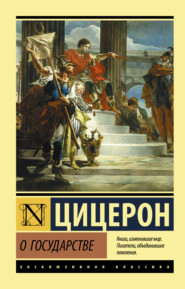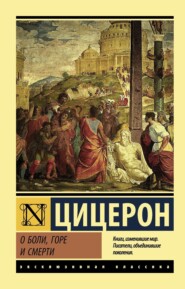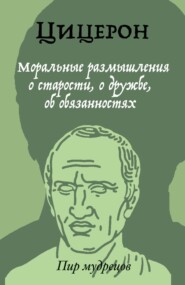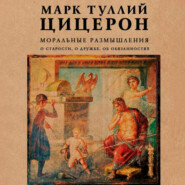По всем вопросам обращайтесь на: info@litportal.ru
(©) 2003-2024.
✖
Cicero's Tusculan Disputations
Автор
Год написания книги
2018
Настройки чтения
Размер шрифта
Высота строк
Поля
X. Let us see what Æschylus says, who was not only a poet but a Pythagorean philosopher also, for that is the account which you have received of him; how doth he make Prometheus bear the pain he suffered for the Lemnian theft, when he clandestinely stole away the celestial fire, and bestowed it on men, and was severely punished by Jupiter for the theft. Fastened to Mount Caucasus, he speaks thus:
Thou heav’n-born race of Titans here fast bound,
Behold thy brother! As the sailors sound
With care the bottom, and their ships confine
To some safe shore, with anchor and with line;
So, by Jove’s dread decree, the God of fire
Confines me here the victim of Jove’s ire.
With baneful art his dire machine he shapes;
From such a God what mortal e’er escapes?
When each third day shall triumph o’er the night,
Then doth the vulture, with his talons light,
Seize on my entrails; which, in rav’nous guise,
He preys on! then with wing extended flies
Aloft, and brushes with his plumes the gore:
But when dire Jove my liver doth restore,
Back he returns impetuous to his prey,
Clapping his wings, he cuts th’ ethereal way.
Thus do I nourish with my blood this pest,
Confined my arms, unable to contest;
Entreating only that in pity Jove
Would take my life, and this cursed plague remove.
But endless ages past unheard my moan,
Sooner shall drops dissolve this very stone.[32 - The lines quoted by Cicero here appear to have come from the Latin play of Prometheus by Accius; the ideas are borrowed, rather than translated, from the Prometheus of Æschylus.]
And therefore it scarcely seems possible to avoid calling a man who is suffering, miserable; and if he is miserable, then pain is an evil.
74XI. A. Hitherto you are on my side; I will see to that by-and-by; and, in the mean while, whence are those verses? I do not remember them.
M. I will inform you, for you are in the right to ask. Do you see that I have much leisure?
A. What, then?
M. I imagine, when you were at Athens, you attended frequently at the schools of the philosophers.
A. Yes, and with great pleasure.
M. You observed, then, that though none of them at that time were very eloquent, yet they used to mix verses with their harangues.
A. Yes, and particularly Dionysius the Stoic used to employ a great many.
M. You say right; but they were quoted without any appropriateness or elegance. But our friend Philo used to give a few select lines and well adapted; and in imitation of him, ever since I took a fancy to this kind of elderly declamation, I have been very fond of quoting our poets; and where I cannot be supplied from them, I translate from the Greek, that the Latin language may not want any kind of ornament in this kind of disputation.
But, do you not see how much harm is done by poets? They introduce the bravest men lamenting over their misfortunes: they soften our minds; and they are, besides, so entertaining, that we do not only read them, but get them by heart. Thus the influence of the poets is added to our want of discipline at home, and our tender and delicate manner of living, so that between them they have deprived virtue of all its vigor and energy. Plato, therefore, was right in banishing them from his commonwealth, where he required the best morals, and the best form of government. But we, who have all our learning from Greece, read and learn these works of theirs from our childhood; and look on this as a liberal and learned education.
XII. But why are we angry with the poets? We may find some philosophers, those masters of virtue, who have taught that pain was the greatest of evils. But you, young man, when you said but just now that it appeared so to you, upon being asked by me what appeared greater than infamy, gave up that opinion at a word. Suppose I ask 75Epicurus the same question. He will answer that a trifling degree of pain is a greater evil than the greatest infamy; for that there is no evil in infamy itself, unless attended with pain. What pain, then, attends Epicurus, when he says that very thing, that pain is the greatest evil! And yet nothing can be a greater disgrace to a philosopher than to talk thus. Therefore, you allowed enough when you admitted that infamy appeared to you to be a greater evil than pain. And if you abide by this admission, you will see how far pain should be resisted; and that our inquiry should be not so much whether pain be an evil, as how the mind may be fortified for resisting it. The Stoics infer from some petty quibbling arguments that it is no evil, as if the dispute were about a word, and not about the thing itself. Why do you impose upon me, Zeno? For when you deny what appears very dreadful to me to be an evil, I am deceived, and am at a loss to know why that which appears to me to be a most miserable thing should be no evil. The answer is, that nothing is an evil but what is base and vicious. You return to your trifling, for you do not remove what made me uneasy. I know that pain is not vice—you need not inform me of that: but show me that it makes no difference to me whether I am in pain or not. It has never anything to do, say you, with a happy life, for that depends upon virtue alone; but yet pain is to be avoided. If I ask, why? It is disagreeable, against nature, hard to bear, woful and afflicting.
XIII. Here are many words to express that by so many different forms which we call by the single word evil. You are defining pain, instead of removing it, when you say, it is disagreeable, unnatural, scarcely possible to be endured or borne, nor are you wrong in saying so: but the man who vaunts himself in such a manner should not give way in his conduct, if it be true that nothing is good but what is honest, and nothing evil but what is disgraceful. This would be wishing, not proving. This argument is a better one, and has more truth in it—that all things which Nature abhors are to be looked upon as evil; that those which she approves of are to be considered as good: for when this is admitted, and the dispute 76about words removed, that which they with reason embrace, and which we call honest, right, becoming, and sometimes include under the general name of virtue, appears so far superior to everything else that all other things which are looked upon as the gifts of fortune, or the good things of the body, seem trifling and insignificant; and no evil whatever, nor all the collective body of evils together, appears to be compared to the evil of infamy. Wherefore, if, as you granted in the beginning, infamy is worse than pain, pain is certainly nothing; for while it appears to you base and unmanly to groan, cry out, lament, or faint under pain; while you cherish notions of probity, dignity, honor, and, keeping your eye on them, refrain yourself, pain will certainly yield to virtue, and, by the influence of imagination, will lose its whole force.—For you must either admit that there is no such thing as virtue, or you must despise every kind of pain. Will you allow of such a virtue as prudence, without which no virtue whatever can even be conceived? What, then? Will that suffer you to labor and take pains to no purpose? Will temperance permit you to do anything to excess? Will it be possible for justice to be maintained by one who through the force of pain discovers secrets, or betrays his confederates, or deserts many duties of life? Will you act in a manner consistently with courage, and its attendants, greatness of soul, resolution, patience, and contempt for all worldly things? Can you hear yourself called a great man when you lie grovelling, dejected, and deploring your condition with a lamentable voice; no one would call you even a man while in such a condition. You must therefore either abandon all pretensions to courage, or else pain must be put out of the question.
XIV. You know very well that, even though part of your Corinthian furniture were gone, the remainder might be safe without that; but if you lose one virtue (though virtue in reality cannot be lost), still if, I say, you should acknowledge that you were deficient in one, you would be stripped of all. Can you, then, call yourself a brave man, of a great soul, endued with patience and steadiness above the frowns of fortune? or Philoctetes? for I choose to instance him, rather than yourself, for he certainly was not 77a brave man, who lay in his bed, which was watered with his tears,
Whose groans, bewailings, and whose bitter cries,
With grief incessant rent the very skies.
I do not deny pain to be pain—for were that the case, in what would courage consist?—but I say it should be assuaged by patience, if there be such a thing as patience: if there be no such thing, why do we speak so in praise of philosophy? or why do we glory in its name? Does pain annoy us? Let it sting us to the heart: if you are without defensive armor, bare your throat to it; but if you are secured by Vulcanian armor, that is to say by resolution, resist it. Should you fail to do so, that guardian of your honor, your courage, will forsake and leave you.—By the laws of Lycurgus, and by those which were given to the Cretans by Jupiter, or which Minos established under the direction of Jupiter, as the poets say, the youths of the State are trained by the practice of hunting, running, enduring hunger and thirst, cold and heat. The boys at Sparta are scourged so at the altars that blood follows the lash in abundance; nay, sometimes, as I used to hear when I was there, they are whipped even to death; and yet not one of them was ever heard to cry out, or so much as groan. What, then? Shall men not be able to bear what boys do? and shall custom have such great force, and reason none at all?
XV. There is some difference between labor and pain; they border upon one another, but still there is a certain difference between them. Labor is a certain exercise of the mind or body, in some employment or undertaking of serious trouble and importance; but pain is a sharp motion in the body, disagreeable to our senses.—Both these feelings, the Greeks, whose language is more copious than ours, express by the common name of Πόνος: therefore they call industrious men painstaking, or, rather, fond of labor; we, more conveniently, call them laborious; for laboring is one thing, and enduring pain another. You see, O Greece! your barrenness of words, sometimes, though you think you are always so rich in them. I say, then, that there is a difference between laboring and being in 78pain. When Caius Marius had an operation performed for a swelling in his thigh, he felt pain; when he headed his troops in a very hot season, he labored. Yet these two feelings bear some resemblance to one another; for the accustoming ourselves to labor makes the endurance of pain more easy to us. And it was because they were influenced by this reason that the founders of the Grecian form of government provided that the bodies of their youth should be strengthened by labor, which custom the Spartans transferred even to their women, who in other cities lived more delicately, keeping within the walls of their houses; but it was otherwise with the Spartans.
The Spartan women, with a manly air,
Fatigues and dangers with their husbands share;
They in fantastic sports have no delight,
Partners with them in exercise and fight.
And in these laborious exercises pain interferes sometimes. They are thrown down, receive blows, have bad falls, and are bruised, and the labor itself produces a sort of callousness to pain.
XVI. As to military service (I speak of our own, not of that of the Spartans, for they used to march slowly to the sound of the flute, and scarce a word of command was given without an anapæst), you may see, in the first place, whence the very name of an army (exercitus[33 - From exerceo.]) is derived; and, secondly, how great the labor is of an army on its march: then consider that they carry more than a fortnight’s provision, and whatever else they may want; that they carry the burden of the stakes,[34 - Each soldier carried a stake, to help form a palisade in front of the camp.] for as to shield, sword, or helmet, they look on them as no more encumbrance than their own limbs, for they say that arms are the limbs of a soldier, and those, indeed, they carry so commodiously that, when there is occasion, they throw down their burdens, and use their arms as readily as their limbs. Why need I mention the exercises of the legions? And how great the labor is which is undergone in the running, encounters, shouts! Hence it is that their minds are worked 79up to make so light of wounds in action. Take a soldier of equal bravery, but undisciplined, and he will seem a woman. Why is it that there is this sensible difference between a raw recruit and a veteran soldier? The age of the young soldiers is for the most part in their favor; but it is practice only that enables men to bear labor and despise wounds. Moreover, we often see, when the wounded are carried off the field, the raw, untried soldier, though but slightly wounded, cries out most shamefully; but the more brave, experienced veteran only inquires for some one to dress his wounds, and says,
Patroclus, to thy aid I must appeal
Ere worse ensue, my bleeding wounds to heal;
The sons of Æsculapius are employ’d,
No room for me, so many are annoy’d.
XVII. This is certainly Eurypylus himself. What an experienced man!—While his friend is continually enlarging on his misfortunes, you may observe that he is so far from weeping that he even assigns a reason why he should bear his wounds with patience.
Who at his enemy a stroke directs,
His sword to light upon himself expects.
Patroclus, I suppose, will lead him off to his chamber to bind up his wounds, at least if he be a man: but not a word of that; he only inquires how the battle went:
Say how the Argives bear themselves in fight?
And yet no words can show the truth as well as those, your deeds and visible sufferings.
Peace! and my wounds bind up;
but though Eurypylus could bear these afflictions, Æsopus could not,
Where Hector’s fortune press’d our yielding troops;
and he explains the rest, though in pain. So unbounded is military glory in a brave man! Shall, then, a veteran soldier be able to behave in this manner, and shall a wise and learned man not be able? Surely the latter might be 80able to bear pain better, and in no small degree either. At present, however, I am confining myself to what is engendered by practice and discipline. I am not yet come to speak of reason and philosophy. You may often hear of old women living without victuals for three or four days; but take away a wrestler’s provisions but for one day, and he will implore the aid of Jupiter Olympius, the very God for whom he exercises himself: he will cry out that he cannot endure it. Great is the force of custom! Sportsmen will continue whole nights in the snow; they will bear being almost frozen upon the mountains. From practice boxers will not so much as utter a groan, however bruised by the cestus. But what do you think of those to whom a victory in the Olympic games seemed almost on a par with the ancient consulships of the Roman people? What wounds will the gladiators bear, who are either barbarians, or the very dregs of mankind! How do they, who are trained to it, prefer being wounded to basely avoiding it! How often do they prove that they consider nothing but the giving satisfaction to their masters or to the people! for when covered with wounds, they send to their masters to learn their pleasure: if it is their will, they are ready to lie down and die. What gladiator, of even moderate reputation, ever gave a sigh? who ever turned pale? who ever disgraced himself either in the actual combat, or even when about to die? who that had been defeated ever drew in his neck to avoid the stroke of death? So great is the force of practice, deliberation, and custom! Shall this, then, be done by
A Samnite rascal, worthy of his trade;
and shall a man born to glory have so soft a part in his soul as not to be able to fortify it by reason and reflection? The sight of the gladiators’ combats is by some looked on as cruel and inhuman, and I do not know, as it is at present managed, but it may be so; but when the guilty fought, we might receive by our ears perhaps (but certainly by our eyes we could not) better training to harden us against pain and death.
XVIII. I have now said enough about the effects of exercise, custom, and careful meditation. Proceed we now 81to consider the force of reason, unless you have something to reply to what has been said.
A. That I should interrupt you! By no means; for your discourse has brought me over to your opinion. Let the Stoics, then, think it their business to determine whether pain be an evil or not, while they endeavor to show by some strained and trifling conclusions, which are nothing to the purpose, that pain is no evil. My opinion is, that whatever it is, it is not so great as it appears; and I say, that men are influenced to a great extent by some false representations and appearance of it, and that all which is really felt is capable of being endured. Where shall I begin, then? Shall I superficially go over what I said before, that my discourse may have a greater scope?













